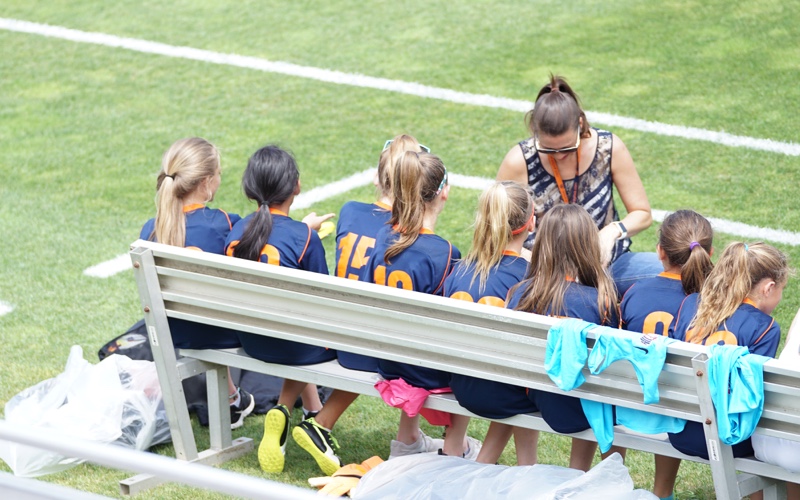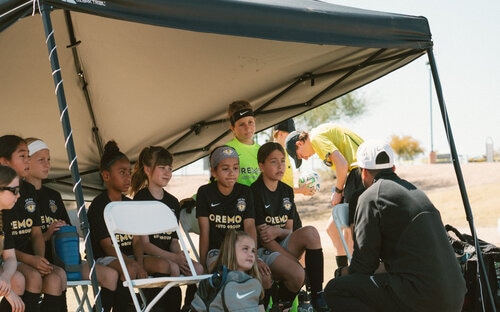
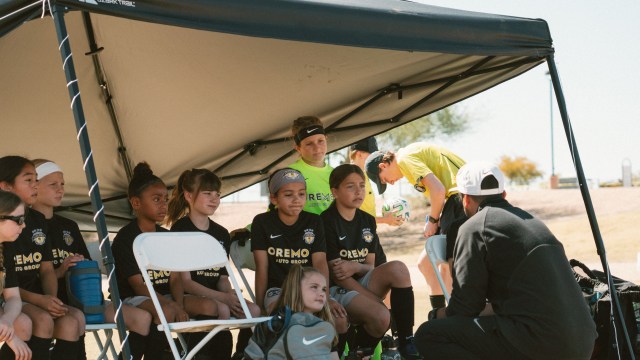
Every soccer player wants to win. That’s a given.
But wanting to win on gameday isn’t enough. Games (and tournaments, and titles) are won over time. They’re won at practice. They’re won by building relationships with your teammates. And they’re won by being committed to all the little habits that help you prepare to perform at your very best.
“Failing to prepare is preparing to fail”
Benjamin Franklin (and a favorite quote of legendary UCLA basketball coach John Wooden)
That means you can’t just show up to the fields and play. You need to prepare your body and brain so that you’re ready to take on and conquer any challenge. Check out these five pregame tips to help you feel relaxed and confident going into every single soccer game.
Get your gear ready the night before
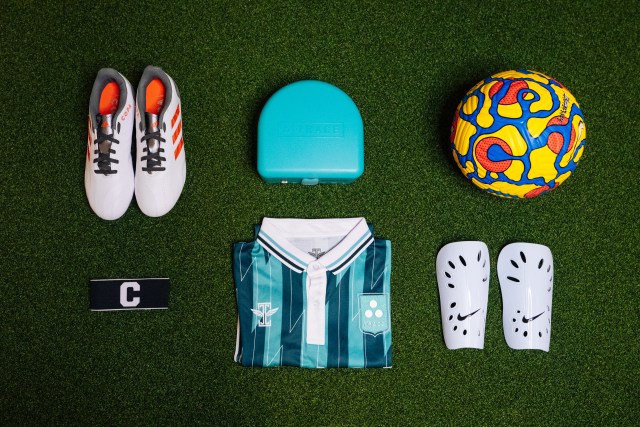
Nobody likes the mad scramble to find missing cleats, socks or shinguards right before you leave for your soccer game. That’s a surefire way to lose focus on the game ahead.
So save yourself that drama — even the possibility of drama — by preparing your gear the night before. Cleats, jerseys, socks, shin guards, flip-flops, water, sunscreen, energy snacks… anything that you could possibly need should be packed away the night before your game. That way, you avoid laundry emergencies and have everything, including yourself, ready to rock.
Treat your body right
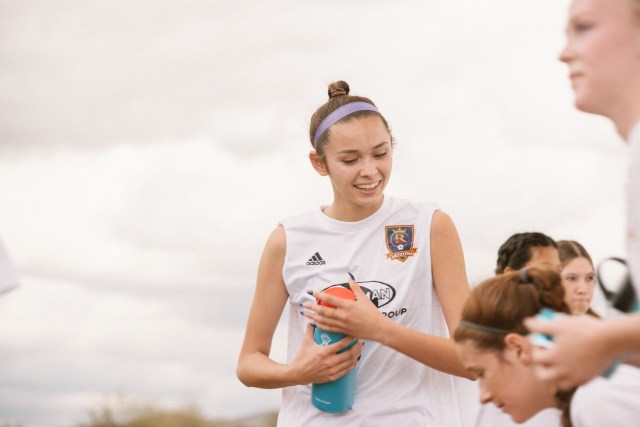
It’s not just your equipment that needs to be ready for action. A soccer game is a tough test for your body, and it’s up to you to prepare it for that challenge. That means getting enough sleep, drinking enough water and eating enough of the right foods.
It’s crucial to understand that treating your body right isn’t just important on gameday. For this to really pay off, you have to commit to these little habits in nutrition, hydration and sleeping that will help guide you to a healthier and happier future.
Sleep: Young athletes should get at least 9 hours of sleep every night. Read that again: every night.
It’s not enough to go to bed early the day before your game. Your body (and your brain!) need lots of sleep to perform at peak levels, and that means building healthy and consistent sleeping habits. That routine might very well include naps, especially if your game is later in the day — Cristiano Ronaldo famously takes five naps every day!
Hydration: Drinking water helps your brain and body function at their absolute best. If you aren’t hydrated enough, you fatigue faster, think more slowly and generally underperform. Thankfully, this one is an easy fix: keep a nice, big water bottle with you at all times, and you’ll find yourself more hydrated than ever before. Another couple of quick and easy tips: cut out the soda (at least for the 24 hours before a game) and avoid caffeine, which is a fast track to dehydration.
Nutrition: Eating right is a crucial part of being a high-level athlete. Proper nutrition helps your body grow, recover and perform. Unfortunately, it’s also something that many youth soccer programs don’t emphasize.
The reality is that players need fuel to perform at their peak, and lots of your favorite foods probably aren’t supplying that fuel properly. Proteins, fats, fiber and sugars are difficult for your body to digest and break down for energy. That means they’re not the best pre-game foods, and will make you feel heavy and lethargic. Starches and complex carbohydrates, on the other hand, are a quick and easy source of energy. That means pasta, rice, potatoes, breads, veggies, lean meats, nuts and seeds and cereals are great choices for pregame meals (and for a mega-meal the night before!)
It’s also important to time your meals right to maximize energy. You should eat your last big meal 3-4 hours before your game kicks off. If you’re still hungry after that, you can always indulge in some light snacking on healthy salty snacks (pretzels and crackers), fruits, juice or anything else healthy and easy to digest.
Find your perfect pregame routine
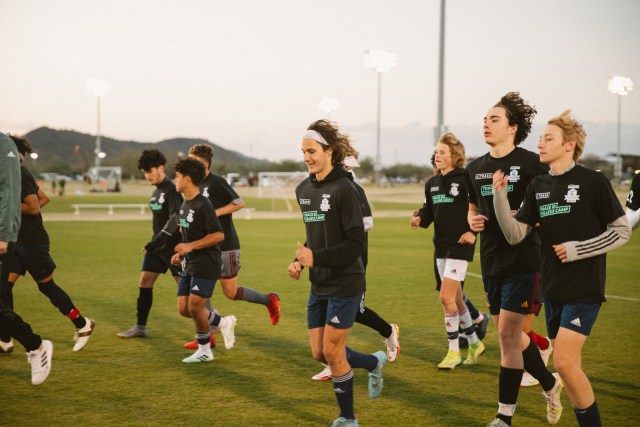
Every player is different. Some need to get super hyped up before every game. Others prefer to step back and chill out. Only you know what you need to get in that perfect headspace for peak performance.
What everyone does need is time. Nobody wants to feel rushed before a soccer game. Routines help you feel confident and in control ahead of your game. Some people like to juggle a soccer ball to clear their mind, while others prefer to sit back and watch old soccer games (or even just a favorite TV show). The two hours before kickoff should be your time to get your head settled and your body ready for action. Just be sure not to hyperfixate on the game itself — you’ll play better if you can relax your body and brain.
It might take a little bit of experimenting to find what works. My own pregame routine took a while to perfect, and now it’s been the same for 10+ years. I make a smoothie. I watch the highlights of Liverpool’s 2005 Champions League victory. I meditate. Then I head to the fields, always playing the same playlist. I arrive at the field 1:15 before kickoff, and spend 30 minutes on some light dynamic stretching. Then, I juggle, dribble and pass the ball with teammates, getting lots of touches to start building rhythm and confidence before our team warm-up starts.
Visualize your successes
Visualization is a powerful psychological tool that will help you play at your very best on gameday. There’s tons of research into how visualizing (or creating complete mental images) helps you perform on the field. But it takes a little practice.
In the days leading up to your game, take a little time to think about how you want to play. Don’t think about winning or losing. Don’t think about making mistakes. Think about what it will look like and feel like to play at your best.
In your head, create a mental picture of what you will do and how you will do it. Picture yourself beating a defender 1v1 with your favorite move. Picture the ball dropping down out of the sky, and picture you swinging your leg to strike the perfect volley. Picture the ball sailing into the top corner.
The more complete the picture in your head, the better. Creating some internal commentary, like you would hear on TV, can help. Bring in all the senses you can — what will it sound like when you shoot the ball, or when it hits that sweet spot between the crossbar and post? What will it feel like as you celebrate that game-winning goal? Creating a vivid mental image will help the experience feel real, and will boost confidence, self-belief and performance.
Trace can help you achieve this. Create a pregame “hype” playlist on Trace iD with some of your favorite moments from previous games that represent how you want to play. Reflecting on your best moments will help build confidence and visualization skills.
Set Specific Goals

It’s important to remember that every game is only one piece of your larger developmental journey. Win or lose, your success is defined by improvement and growth. That means your priority going into any given game shouldn’t just be to win: you should have specific goals you want to achieve based on your needs.
Those goals will change depending on your position and the way you play. If you want to be more confident on the ball, challenge yourself to dribble at 3 players in 1v1 situations. If you want to score more goals, push yourself to shoot the ball at least twice today. If you’re a central midfielder, maybe you push yourself to be more involved by counting every time you touch the ball.
Your team should also set specific, collective goals based on what you worked on this week at practice. This is something the team should discuss at practice ahead of the game, so that you can keep it in your mind as you prepare. You can even include those goals in your visualization practice!
This is another area where Trace will help you become the player you want to be. Part of your pregame routine could include looking back at previous games’ moments to recognize a few key areas you want to improve in your game today.
